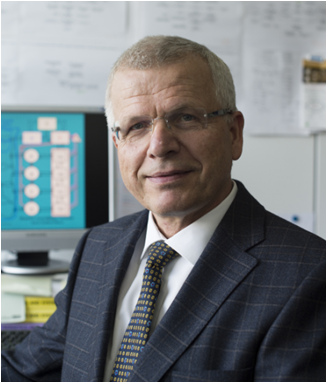 Markus Schwaninger
Markus Schwaninger
He is a professor of management at the University of St. Gallen, Switzerland (emeritus since 2013). Born in Salzburg, Austria; double citizenship – Austrian and Swiss. His research and teaching are focused on the management of complex dynamic systems, with a methodological emphasis on System Dynamics and Organizational Cybernetics. Research projects are related to organizational intelligence, model-based management, the design, transformation and learning of organizations, and systemic issues of sustainability.
Consulting and training mandates span all sectors, – industry, services, public and NGO, around the world. Markus is the author of ca. 230 publications, in six languages, including his latest book Intelligent Organizations (Springer). He has lectured widely, on four continents, and is involved in international, transdisciplinary research projects.
His partnerships include projects with leading universities, e.g., the Massachusetts Institute of Technology, Cambridge, U.S.A.; Dartmouth College, Hanover, U.S.A.; Sustainability Laboratory, New York, U.S.A; The London School of Economics, London, U.K.; Fundação Getúlio Vargas, São Paulo, Brazil; Universidad de los Andes, Bogotá, Colombia; Universidad de Valladolid, Valladolid, Spain; and the Swiss Federal Institute of Technology (ETHZ), Zurich, Switzerland.
Markus is also a director of the World Organization of Systems and Cybernetics, and a managing editor of the System Dynamics Review.
Websites:
https://www.alexandria.unisg.ch/Personen/Markus_Schwaninger/L-en
http://www.ifb.unisg.ch/en/Forschung/Modelling+and+Simulation
What fascinates you about your field of research?
Research in the field of systemic management is a fascinating task, because it is highly relevant for the creation of a sustainable future. In short, we are creating models for a “better world”, trying to help decision-makers design and govern social systems for viability and development. Our research should and can be done with methodological rigor, which makes this work challenging and stimulating. Finally, the collaboration with colleagues from all over the world contributes to a propitious atmosphere – or better, noosphere – which emerges from the interaction of human minds.
Where do you see or would like to see the field heading?
My wish is that the systems approach, with its different streams and methodologies, help our society in coping with the ubiquitous difficult issues and problems. The world is in crisis and we must contribute to weathering it, ushering in an era of ecological and social sustainability. It is extremely important that the systems community be grounded in a strong ethos, abiding by the highest standards of scientific and practical work.
Is there an author / thinker, whose work inspires you in your own work?
There is not one, but there are many people in the systems community who exert tremendous inspiration. For me personally, my two mentors have helped me with their intellectual power and generous personalities. One is Anatol Rapoport, a founder of The Society for General Systems Research (today: International Society for the Systems Sciences), and an authority in philosophy, biological mathematics, game theory and peace reseach. The other one being Stafford Beer, the father of Managerial Cybernetics, and an unorthodox thinker, who bestowed the powerful Viable System Model and the Team Syntegrity Protocol on us. Also Jay Forrester, the inventor of System Dynamics, Russell Ackoff, pioneer of social systems design, and Heinz von Foerster, father of Second-Order Cybernetics and Constructivism, have an enduring influence on my work.
What fascinates you about “Organizing for Sustainability”? In your own words: Why should people go there?
Under this topic, a proposal for enabling sustainability at all levels, from individual to world, is offered. The potential contribution of Cybernetics and Systems to help humanity cope with complex challenges and respond to global issues is huge. Until now, this potential has only been actualized to a small fraction. We can continue making it real, building bridges towards a desirable future.



